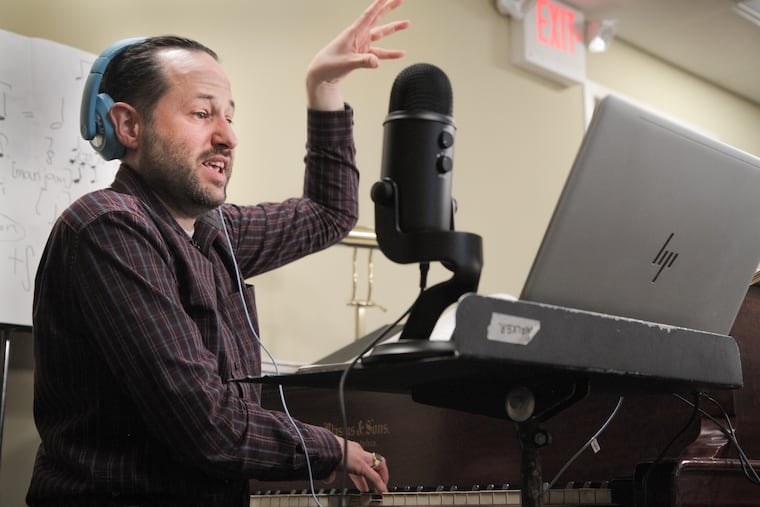How do you conduct virtual choir practices with more than 300 kids? The Philadelphia Boys Choir is learning how.
Since March 16, the choir’s four boys’ ensembles have been hosting nine Zoom rehearsals every week.

What’s the best way to sing the word America?
The members of the Philadelphia Boys Choir and Chorale, who are not sacrificing good diction to this pandemic, discussed the proper enunciation.
“Somebody type in one thing you need to be thinking about in that [musical] phrase,” Jeffrey Smith told the choir. Then the choir’s artistic director waited for their responses to appear in a Zoom chat box.
“Yes, Uh-MEH-rih-KUH," Smith demonstrated, with a short "e" and subtle "r" that slips into place before the next note.
“America, America, God shed his grace on thee.”
As Smith watched to see if students were holding their binders and following along, he taught them where to take a breath, where the altos needed to turn one syllable into three notes, and more: What was proper virtual chat etiquette? Questions for the director? Sure. Questions about ... other topics?
“The chat box is not for people like Levi to write, ‘What about my butt,’ ” Smith clarified early on, “but for me to communicate with you.”
Since March 16, the boys’ choir’s four ensembles have been hosting nine Zoom rehearsals every week, while its sister organization, Philadelphia Girls Choir, is running roughly 14 among its four ensembles, said Smith.
They’re preparing for the concerts that will come after the pandemic, which means there’s quite a bit of repertoire to memorize. In virtual rehearsals so far, those have included a Duke Ellington medley, blessings in Hebrew, and “Gloria” from Benjamin Britten’s Missa Brevis.
"We’re learning enough music to fill a two-hour concert,” Smith said.
Choirs and orchestras around the world have been coordinating virtual concerts, some to viral audiences. But to rehearse virtually, via the videoconferencing app Zoom, with roughly 300 kids, and no way to sync up voices is another story.
» READ MORE: Coronavirus forced the Philadelphia Orchestra to play to an empty house. And I was there to witness it.
First, Smith researched apps, then he compiled instructions for connecting to the choir through Zoom, offering options for different devices, including smartphones and landlines for families without computers or tablets at home.
Then came the real work.
Rehearsal requires practicing the material measure by measure, part by part — but essentially, individually. Without the ability to get multiple feeds to work in perfect unison, organizers prevent all-out cacophony by having members watch, for the most part, on mute and sing on their own.
This has taught Griffin Miller, an 11-year-old choir member from Lansdowne, some things about his own voice.
» READ MORE: The latest news on the coronavirus
“I never knew I could sing as loud as I actually do now that we’re doing virtual rehearsals,” said Griffin, who spoke in a Zoom conference with Smith and two 13-year-old choir members, Oliver Jackson of South Philadelphia and Max Ebenreiter of West Chester. Jackson and Ebenreiter quickly agreed.
“You don’t want your voice to stand out in the choir,” Ebenreiter explained, “so you can sing a lot louder than you normally would.”
Still, choir members say, some things can’t be learned as easily when you’re apart.
“Like tempo and dynamics and the volume you’re supposed to sing it," Ebenreiter gave as examples.
In a sense, their time apart is showing them the skills that come from togetherness, or, as Smith calls it, “strength in numbers.”
“The whole is greater than the sum of its parts,” said Smith, who noted that some of their music is in eight-part harmonies. “There’s something about that group mentality and a teamwork feeling and everything. Fortunately, having the videoconferencing — as opposed to me just teaching to a video that they watch on their own — at least they’re seeing each other....
"And yet, it’s still not the same as being together.”
Miller can’t detect how voices blend. And Ebenreiter is missing opportunities to self-correct.
“If you’re making a mistake, you can listen to the group and kind of [assess] yourself and say, ‘OK, what do I have to fix?’” he said.
For the boys, the situation hasn’t resulted in a significant drop-off in attendance, Smith said. Someone who is absent gets an email checking in on their connectivity. On the girls’ side, at least in some cases, attendance has improved.
Zoom allows parents to skip the commutes to choir offices near Broad and Spring Garden Streets, and rehearsals offer a respite from sitting around the house, watching TV, or completing online schoolwork.
“Everything else in the world has stopped, and we’re still able to do rehearsal,” said Jackson. “After a day of nothing, you can go into rehearsal and sing.”
Staff videographers Raishad Hardnett and Astrid Rodrigues contributed to this article.